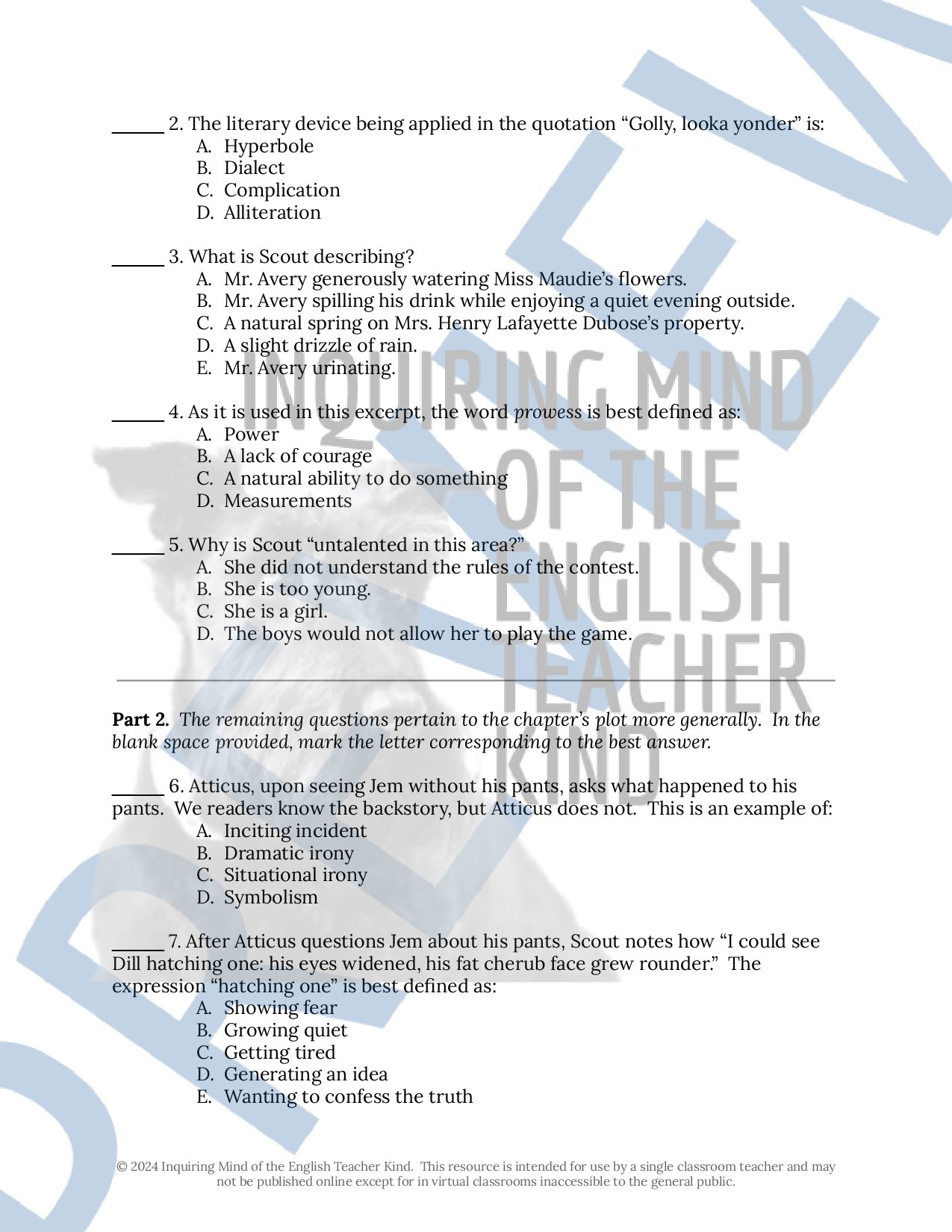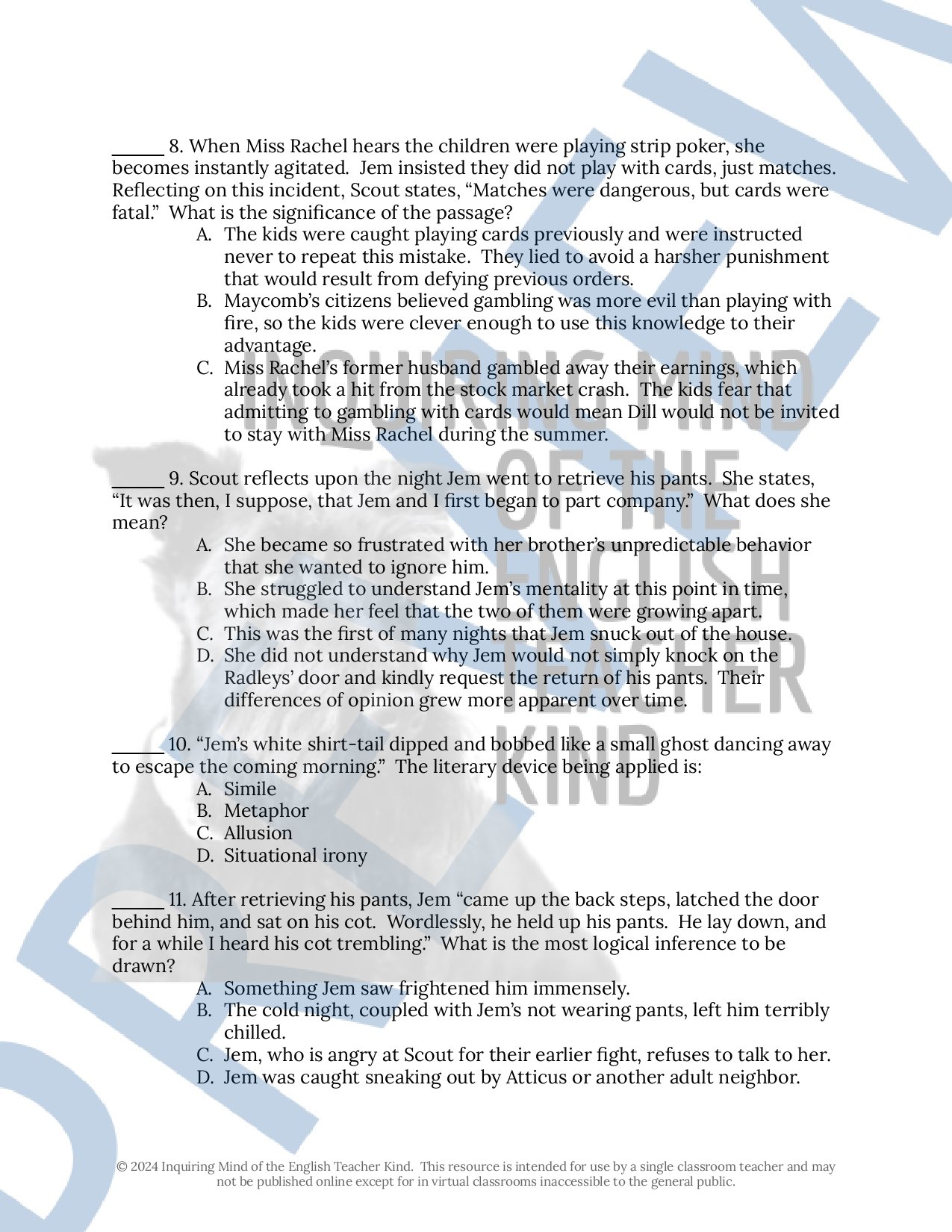 Image 1 of 16
Image 1 of 16

 Image 2 of 16
Image 2 of 16

 Image 3 of 16
Image 3 of 16

 Image 4 of 16
Image 4 of 16

 Image 5 of 16
Image 5 of 16

 Image 6 of 16
Image 6 of 16

 Image 7 of 16
Image 7 of 16

 Image 8 of 16
Image 8 of 16

 Image 9 of 16
Image 9 of 16

 Image 10 of 16
Image 10 of 16

 Image 11 of 16
Image 11 of 16

 Image 12 of 16
Image 12 of 16

 Image 13 of 16
Image 13 of 16

 Image 14 of 16
Image 14 of 16

 Image 15 of 16
Image 15 of 16

 Image 16 of 16
Image 16 of 16

















To Kill a Mockingbird Chapters 6-7 Quizzes, Inference Worksheets, and Vocabulary Games
Evaluate reading comprehension, support vocabulary development, and sharpen critical thinking and literary craft analysis skills with these activities and assessments covering chapters 6 and 7 of To Kill a Mockingbird by Harper Lee. Two plot-based quizzes, two close reading inference worksheets, three vocabulary activities, and answer keys are included. Materials are delivered in editable Word Document and printable PDF formats. (Alternatively, a Google Drive bundle option is available.) By engaging in these exercises, students will:
Read for literal comprehension
Consult reference materials to learn and verify word meanings as needed
Discern the most proper application of words as they are used in sentences
Infer the intended effects of the author's word choices and narrative techniques
Determine the greater significance of a particular excerpt
Explore how characters think, behave, interact, and develop
Apply knowledge of literary devices including dialect, foreshadowing, slang, simile, and dramatic irony
Come to class better prepared to discuss works of fiction
Instructional materials are available for a variety of novels:
Evaluate reading comprehension, support vocabulary development, and sharpen critical thinking and literary craft analysis skills with these activities and assessments covering chapters 6 and 7 of To Kill a Mockingbird by Harper Lee. Two plot-based quizzes, two close reading inference worksheets, three vocabulary activities, and answer keys are included. Materials are delivered in editable Word Document and printable PDF formats. (Alternatively, a Google Drive bundle option is available.) By engaging in these exercises, students will:
Read for literal comprehension
Consult reference materials to learn and verify word meanings as needed
Discern the most proper application of words as they are used in sentences
Infer the intended effects of the author's word choices and narrative techniques
Determine the greater significance of a particular excerpt
Explore how characters think, behave, interact, and develop
Apply knowledge of literary devices including dialect, foreshadowing, slang, simile, and dramatic irony
Come to class better prepared to discuss works of fiction
Instructional materials are available for a variety of novels:


Evaluate reading comprehension, support vocabulary development, and sharpen critical thinking and literary craft analysis skills with these activities and assessments covering chapters 6 and 7 of To Kill a Mockingbird by Harper Lee. Two plot-based quizzes, two close reading inference worksheets, three vocabulary activities, and answer keys are included. Materials are delivered in editable Word Document and printable PDF formats. (Alternatively, a Google Drive bundle option is available.) By engaging in these exercises, students will:
Read for literal comprehension
Consult reference materials to learn and verify word meanings as needed
Discern the most proper application of words as they are used in sentences
Infer the intended effects of the author's word choices and narrative techniques
Determine the greater significance of a particular excerpt
Explore how characters think, behave, interact, and develop
Apply knowledge of literary devices including dialect, foreshadowing, slang, simile, and dramatic irony
Come to class better prepared to discuss works of fiction
Instructional materials are available for a variety of novels:
Preview this resource:
Evaluate reading comprehension, support vocabulary development, and sharpen critical thinking and literary craft analysis skills with these activities and assessments covering chapters 6 and 7 of To Kill a Mockingbird by Harper Lee. Two plot-based quizzes, two close reading inference worksheets, three vocabulary activities, and answer keys are included.
